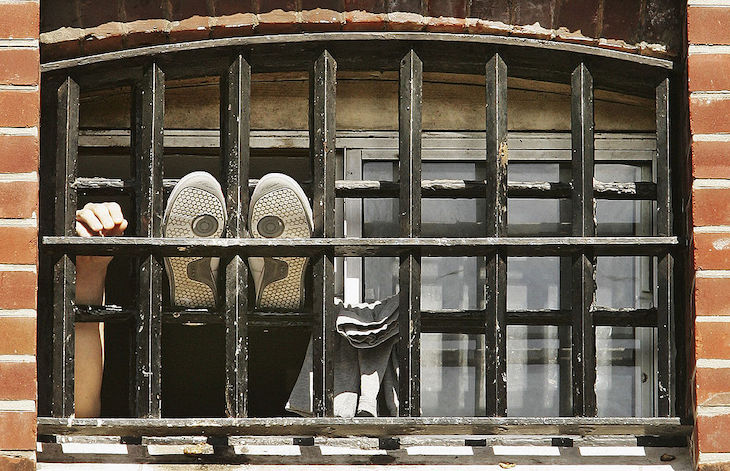In the aftermath of Daniel Khalife’s escape and recapture, prisons are in the headlines. Even the most commonplace events, like a prison stabbing, are being widely reported. So, too, is the revelation that ‘prisoners are working in McDonald’s’: that was the gist of an article in the Daily Mail which revealed that a female prisoner was flipping burger and serving customers. But rather than condemn this initiative, we should praise McDonald’s for taking on inmates and giving them another chance.
The female McDonald’s worker, who returned to Askham Grange in Yorkshire after her shift, is far from alone in being let out for the day: approximately 100,000 Releases on Temporary Licence (ROTLs) occur every three months. These releases mostly take place from Category D or ‘open’ prisons. Open prisons are low security establishments for inmates in the last three years of their sentence who are deemed to pose a minimal risk. They’re also one of the few bright lights in our prison system, which offer genuine opportunities for rehabilitation.
Not every prisoner at an open prison will be eligible for ROTL. Before such a privilege is granted a ‘board’ of senior prison staff will interview the prisoner and further checks must be satisfied. The local police will also be made aware and each prisoner’s licence will carry specific conditions which must not be breached.
They worked hard, long hours, rather than wasting their sentence staring at a cell’s walls
Prisoners may be allowed out to attend a local college or university, spend time reestablishing family ties or to work for local employers. Release for work purposes represents about two-thirds of all ROTLs. Prisoners recognise that ROTL is a great privilege, and know a breach of conditions will probably mean being returned to a closed prison for the rest of their sentence. As a result the failure rate of ROTLs is just 0.2 per cent.
Prisoners working via ROTL often perform difficult and unpleasant jobs which employers struggle to recruit for. While I was serving time at HMP Hollesley Bay, an open prison on the Suffolk coast, large numbers of prisoners left each day to work in local slaughterhouses, kitchens and warehouses. They worked hard, long hours, rather than wasting their sentence staring at a cell’s walls.
Each ROTL worker pays tax and NI on their income, just as anyone else would. On top of that they pay a further portion (typically 40 per cent) of their net income to the Victim Surcharge fund, compensating victims. These prisoners also have to pay for their own travel to and from work, and fund their own food when they are absent from the prison during meal times. Taxpayers and victims are better off as a result.
More importantly we know, as the Ministry of Justice points out, that having ‘a job on release helps to support people leaving prison rebuild their lives, reducing reoffending and preventing future victims of crime’. The MOJ’s analysis suggests that prisoners who have any work at all in the year after release are between 5 per cent and 10 cent less likely to reoffend.
Prisoners typically either save what income they have remaining or send it to their families. As a result, when they leave prison they are more likely to be able to afford to live and have a supportive family to rejoin. Matthew, a former prisoner I spoke to who asked for his name to be changed, told me:
‘During the last 18 months of my sentence I worked via…ROTL…the wages that I earned enabled me to pay back my victims using the 40 per cent levy prisoners have to pay out of their wages and…I was able to support my wife and daughter who financially struggled due to me being incarcerated.’
Employers too are full of praise. James Timpson, chief executive of Timpson Group, speaks highly of the scheme:
‘ROTL is a fantastic route to long term employment for prison leavers, and for us at Timpson leads to an 85 per cent success rate. We have over 100 colleagues today leaving their cells and working in our business, and they are very valued colleagues, treated the same as everyone else.’
Many prisoners also use ROTL to get meaningful qualifications at colleges or universities. This access to education can transform lives. Jerry, whose name has been changed, left school at 16. In his mid-30s he was sentenced to five years in prison. At an open prison and with two years left to serve he applied successfully for a degree at a local university. Jerry said this ‘allowed me to develop my skills, rebuild my discipline and focus after years behind a cell door, and taught me commitment. I also met my employer through the university which led me to a new career path and a positive future after prison.’
Jerry now works full-time for that employer, and is aiming to finish the final year of his degree. A man who thought his life was over is now a hard-working, taxpaying member of society.
It’s harder to measure, but I’ve seen work on ROTL transform attitudes too. At Hollesley Bay, many of my fellow prisoners had never worked in an honest job. For decades they’d lived with the knowledge that if, or when the police caught up with them all their money would be forfeit as proceeds of crime. Earning honest, taxed wages showed them another path, to money that was really theirs.
Instead of being shocked that employers like McDonald’s are helping prisoners to reform and rebuild their lives we should applaud them.






Comments